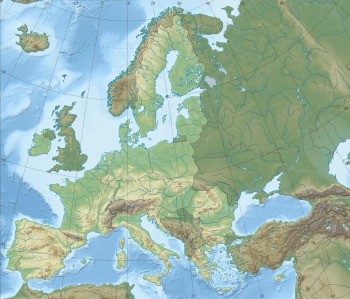
Back مقرات مؤسسات الاتحاد الأوروبي Arabic Seus de les institucions de la Unió Europea Catalan Sièges des institutions de l'Union européenne French Sëtz vun den europäeschen Institutiounen LB Местоположба на европските институции Macedonian Siedziby instytucji Unii Europejskiej Polish
Brussels: Commission, Council of Ministers, European Council, Parliament (2nd)
Frankfurt am Main: Central Bank
Luxembourg: Secretariat of the European Parliament, Council of Ministers (2nd), Court of Justice of the European Union, Court of Auditors, Commission (various departments and services)
Strasbourg: Parliament
The seven institutions of the European Union (EU) are seated in four different cities, which are Brussels (Belgium), Frankfurt am Main (Germany), Luxembourg (Luxembourg) and Strasbourg (France), rather than being concentrated in a single capital city. All four were chosen, among various reasons, for their location halfway between France and Germany, the countries whose rivalry led to two World Wars and whose reconciliation paved the way for European integration. The EU agencies and other bodies are located all across the union,[1] but usually not fixed in the treaties. The Hague is the only exception, as the fixed seat of the Agency for Law Enforcement Cooperation (Europol). Luxembourg City is the EU capital that can lay claim to having the most of the seven EU institutions based wholly or partly upon its territory, with only the European Council and European Central Bank not having a presence in the city. Over the years, Brussels has become the EU's political hub, with the College of the Commissioners – the European Commission's politically accountable executive – and the European Council both meeting at their Brussels-based headquarters, and the European Parliament and Council of the EU holding the majority of their meetings annually within the city. This has led media to describe it as the de facto "capital of the EU".
The seats have been a matter of political dispute since the states first failed to reach an agreement at the establishment of the European Coal and Steel Community in 1952. However, a final agreement between member states was reached in 1992, and later attached to the Treaty of Amsterdam.[2]
Despite this, the seat of the European Parliament remains controversial. The work of Parliament is divided between Brussels, Luxembourg City and Strasbourg, which is seen as a problem due to the large number of MEPs, staff, and documents which need to be moved.[3] As the locations of the major seats have been enshrined in the treaties of the European Union, Parliament has no right to decide its own seat.[4]
Locating new bodies is also not without political disputes. The European Central Bank's (ECB) seat had to symbolise its independence from political control, and was located in a city which did not already host a national government or European institution.[5] Some new agencies have also been based in eastern Europe since 2004 to balance their distribution across the EU.[6]
- ^ Cite error: The named reference
p8was invoked but never defined (see the help page). - ^ Cite error: The named reference
ENA seatswas invoked but never defined (see the help page). - ^ Cite error: The named reference
ENA parlwas invoked but never defined (see the help page). - ^ Cite error: The named reference
Strangewas invoked but never defined (see the help page). - ^ Cite error: The named reference
IHT Gerwitz 1992was invoked but never defined (see the help page). - ^ "Galileo Guess Who: EU States Vie to Host Galileo Supervisory Authority". GPS World. 6 December 2006. Archived from the original on 8 August 2007. Retrieved 18 July 2007.
© MMXXIII Rich X Search. We shall prevail. All rights reserved. Rich X Search
